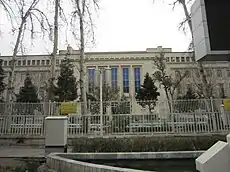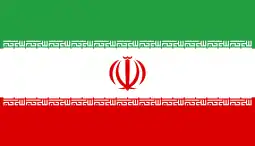Ministry of Economic Affairs and Finance (Iran)
 |
|---|
| This article is part of a series on the politics and government of Iran |
| Government of Islamic Republic of Iran |
|
| وزارت اقتصاد و امور دارایی | |
 | |
 | |
| Agency overview | |
|---|---|
| Formed | 1906 |
| Jurisdiction | Islamic Republic of Iran |
| Headquarters | Bab Homayoun Street, Tehran |
| Employees | 117,123 (2019)[1] |
| Minister responsible |
|
| Website | Official website |
The Ministry of Economic Affairs and Finance's functions are:[2]
- acting as the state treasury,
- public finance,
- economic and financial policy making,
- implementing tax policies,
- in charge of foreign direct investment,
- directing the banking network and commercial insurance institutes,
- regulating the financial markets of the country, see also: Securities and Exchange Organization (SEO) & Central Bank of Iran.
Most of the policy making organizations and institutes in the field of trade in goods and services are affiliated to the Ministry of Economic Affairs and Finance.
Ministers of Finance under Pahlavi dynasty
- Mohammad Ali Foroughi, 1924-1925
- Morteza Gholi Bayat, 1925-?
- Vossug ed Dowleh, 1926
- Firouz Nosrat-ed-Dowleh III, 1927-1929
- Mohammad Ali Farzin, 1929
- Hassan Mashhar, 1929-1930
- Hassan Taqizadeh, 1930-1933
- Ali Akbar Davar, 1933-1937
- Mahmud Badr, 1938-1939
- Rezagholi Amir Khosravi, 1939-1941
- Abbasqoli Golshayan, 1941
- Hassan Musharraf Nafisi, 1941-?
- Mahmoud Nariman, ?-1943
- Morteza-Qoli Bayat, 1943-?
- Allah-Yar Saleh, 1943
- Bagher Kazemi, 1943-?
- Mahmud Badr, ?-1945
- Abdolhossein Hazhir, 1945
- Morteza-Qoli Bayat, 1945-1946
- Abolqasem Najm, 1945-1946
- Abdolhossein Hazhir, 1946
- Morteza-Qoli Bayat, 1946-?
- Abdol-Hossein Behnia, ?-1948
- Abbasqoli Golshayan, 1948-1950
- Abdol-Hossein Behnia, 1950
- Mohammad Ali Varasteh, 1950
- Taghi Nasr, 1950-?
- Mohammad Ali Varasteh, 1950-1951
- Ali Asghar Forouzan, ?-1951
- Mohammad Ali Varasteh, 1951-1952
- Seyed Baqer Kazemi, 1952-1953
- Ali Amini, 1953-1954-?
- Ali Asghar Nasser, ?-1955
- Mohammad Sajadi, 1955-1957
- Taghi Nasr, 1957-?
- Qolam Hosein Foruhar, ?-1957-?
- Ali Asghar Nasser, ?-1958-?
- Ali-Akbar Zargham, 1959-1961
- Abdolbaghi Shoai, 1961-1962
- Jahangir Amuzegar, 1962
- Abdol-Hossein Behnia, 1962-1963
- Abdolbaghi Shoai, ?-1963
- Abdol-Hossein Behnia, 1963-1964
- Amir-Abbas Hoveida, 1964-1965
- Jamshid Amouzegar, 1965-1974
- Hushang Ansary, 1974-1977
- Mohammad Yeganeh, 1977-1978
- Hassan-Ali Mehran, 1978-1979
Ministers of Finance of the Islamic Republic of Iran
- Rostam Pirasteh, 1979
- Ali Ardalan, 1979
- Abolhassan Bani Sadr, 1979-1980
- Reza Salimi, (acting) 1980
- Mohsen Nourbakhsh, (acting) 1980-1981
- Hossein Namazi, 1980-1985
- Mohammad Javad Irvani, 1986-1988
- Mohsen Nourbakhsh, 1989-1993
- Morteza Mohammadkhan, 1993-1997
- Hossein Namazi, 1997-2001
- Tahmasb Mazaheri, 2001-2004
- Safdar Hosseini, 2004-2005
- Davoud Danesh-Jafari, 2005-2008
- Hossein Samsami, (acting) 2008
- Shamseddin Hosseini, 2008-2013
- Ali Tayebnia, 2013-2017
- Masoud Karbasian, 2017-2018
- Rahmatollah Akrami, 2018
- Farhad Dejpasand, since 2018
The Customs Administration of the Islamic Republic of Iran
The Customs Administration is affiliated to the Ministry of Economic Affairs and Finance. All activities regarding importation, exportation, transit, collection of import duties and other cases such as temporary importation are carried out by the Customs Administration, which is in charge of implementing the Customs Affairs Act of the Iranian year 1350 (1971), and its Executive By-Law.
Organization for Collection and Sale of State-owned Properties of Iran (OCSSPI)
Affiliated to the Ministry of Economic Affairs and Finance, The main purpose of the formation of the Organization for Collection and Sale of State-owned Properties of Iran (OCSSPI) is to focus all matters relating to the collection, storage, management and sale of properties that by law are under the ownership, possession, custody or management by the government.
State Tax Organization
Affiliated to the Ministry of Economic Affairs and Finance, the Iranian National Tax Administration is in charge of collection of taxes and the supervision of the implementation of tax all laws and regulations in Iran. Iran is implementing a bar code system (called 'Irancode') across the country in order to facilitate e-commerce and tax collection.[3][4]
Privatization Organization
According to the Fourth Five-Year Economic Development Plan (2005-2010), the Privatization Organization of Iran, affiliated to the Ministry of Economic Affairs and Finance is in charge of setting prices and ceding shares of government owned companies to the general public and on the Tehran Stock Exchange. President of Iranian Privatization Organization is Ali-Ashraf Abdollah Porihoseini.
Organization for Investment Economic and Technical Assistance
Affiliated to the Ministry of Economic Affairs and Finance, the Organization for Investment Economic and Technical Assistance (OIETA) has been established to centralize, regulate and perform a host of activities related to foreign investments in Iran, Iran's foreign investments abroad, providing loans and credit facilities to foreign firms, institutes or governments as well as obtaining loan or credit from foreign or international sources. OIETA is a "one-stop institution" for foreign direct investment in Iran.
See also
- Ministry of Commerce (Iran)
- Organization for Collection and Sale of State-owned Properties of Iran (OCSSPI)
- Economy of Iran
- Cabinet of Iran
- Government of Iran
- Supreme Audit Court of Iran
- General Inspection Office (Iran)
- Iran's international rankings in economy
References
- جزییات تعداد کارمندان دولت در سال ۹۷ Tasnim News
- "Archived copy" (PDF). Archived from the original (PDF) on 10 March 2013. Retrieved 10 March 2013.CS1 maint: archived copy as title (link)
- http://www.iran-daily.com/1387/3194/html/economy.htm. Retrieved 6 July 2010. Missing or empty
|title=(help) - http://www.nitc.co.ir/iran-daily/1388/3438/html/economy.htm#s389754%5B%5D
External links
| Wikimedia Commons has media related to Ministry of Finance (Iran). |
